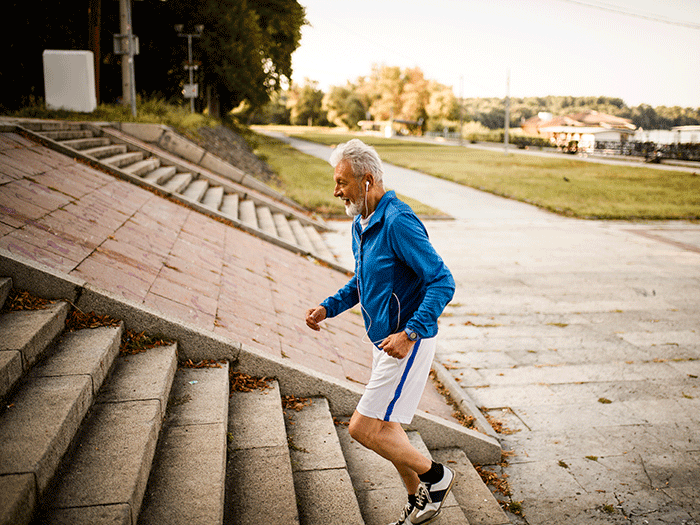How Crucial Is Cardio to Heart Health?
It's important, but your heart craves other forms of exercise too. Here's a workout plan that will keep it strong.

When it comes to strengthening your heart, lowering your blood pressure, and cutting your risk of heart disease, nothing beats a brisk walk, a bike ride, or a take-your-pick cardio workout.
Or does it?
It’s true that aerobic exercise (a.k.a. cardio or endurance exercise) is the most efficient form of exercise for improving cardiometabolic health, according to research in the American Journal of Cardiology.
One Iowa State University study even found that running for just 10 minutes per day—at slow speeds—is associated with a lower risk of dying from cardiovascular disease.
However, aerobic exercise doesn't have a monopoly on working and strengthening your heart. In fact, all movement is actually cardiovascular, with every strength move and stretch increasing the workload on your heart, lungs, veins, arteries, and entire cardiovascular system, says Scott Collier, Ph.D., a professor of cardiovascular exercise science at Appalachian State University.
In fact, he adds, non-aerobic forms of exercise can improve heart health in ways that cardio can’t.
Add SilverSneakers to your wellness routine! Classes and events are happening right now at participating gyms, online through SilverSneakers LIVE, and at community centers near you. Activate your free online account to get started.
How Cardio Became King of Heart Health
Typically, cardio workouts use oxygen to burn carbs and fat as your main energy source. Health and fitness experts call this "aerobic metabolism."
The most obvious examples include walking, swimming, and aerobics or water aerobics classes. But any type of endurance activity that you maintain for more than a few minutes at a time—using the elliptical, playing pickleball, dancing in Zumba class—would fall into this category.
They're so darn good for the heart because they build up the body's capacity to use oxygen. With every aerobic workout, your heart's pumping chambers get better and better at sending blood and oxygen to the muscles.
This increased efficiency means your heart doesn't have to work as hard to power you through your day. Your resting heart rate slows, and you'll notice you have more stamina.
It's so important that the American Heart Association recommends performing 150 minutes of aerobic exercise per week. That's about 22 minutes every day of the week. And you can break it up into small chunks throughout the day if you want!
So, Where Does Strength Training Fit In?
Mounting research shows that strength training (a.k.a. resistance training), which includes bodyweight exercises like squats and pushups, is a nonnegotiable for heart health. Check out the many ways it affects your cardiovascular factors.
How It Affects Blood Pressure
One study in the Journal of Strength and Conditioning Research, for example, found moderate-intensity strength training lowered blood pressure in exercisers.
What's more, when compared with aerobic exercise, strength training had a greater positive impact on post-exercise blood pressure levels. It also increased total-body blood flow to a greater degree than aerobic exercise did, explains Collier, who was the study's coauthor.
Collier also notes that the perks of resistance training on blood pressure can last up to 24 hours in those who fit in 30- to 45-minute circuits three times a week.
How It Affects Cholesterol
Strength training also protects cardiovascular health by improving cholesterol levels and function. In a Journal of Applied Physiology study, researchers found men who regularly strength train have better-functioning HDL cholesterol, compared with those who never strength train.
HDL is short for high-density lipoproteins and is considered "good." It's the type of cholesterol that you want to be high: 40 mg/dL or higher for men and 50 mg/dL or higher for women, according to the National Heart, Lung, and Blood Association. That's because it captures excess cholesterol in the bloodstream and moves it to the liver, where it can be broken down.
How It Affects Muscle Mass
Another way strength training shines is for its ability to alter body composition, which has a huge impact on cardiovascular disease risk factors. Most obviously, strength training is the most effective method for increasing muscle mass.
More surprisingly, though, low levels of muscle mass may be a risk factor for heart disease, according to a study in Arteriosclerosis, Thrombosis, and Vascular Biology. The study found more muscle mass was associated with less plaque buildup in the body’s coronary arteries.
As Collier explains, your body's muscles act as a reserve for blood. They also help pump blood from the extremities to the heart.
How It Affects Fat Mass
By building metabolically active muscle, strength training also impacts another component of your body composition: fat.
Specifically, strength training is more effective than cardio when it comes to combatting deep belly fat. This type of fat, also called visceral fat, sits in and around the organs-and increases your risk of heart disease.
In a Harvard School of Public Health study, researchers followed 10,500 men for 12 years and found those who spent 20 minutes per day strength training gained less abdominal fat than who spent the same amount of time doing cardio workouts.
Ready to get strong—and help your heart? Check out our guide to strength training.
Subscribe to our newsletter
It's quick and easy. You could be one of the 13 million people who are eligible.
Already a member? Click to discover our 15,000+ participating locations.
Follow Us
Your Quiet Time Has a Place Too
There’s another part of your daily life that can do a number on your heart: stress. And for your healthiest heart, it’s vital to manage stress, especially if you have a chronic condition or have previously had a heart attack.
Luckily, any exercise you enjoy and helps you clear your head can benefit the heart by lowering stress levels, says Christie Kuo, R.N., a nurse at Massachusetts General Hospital who uses yoga and mindfulness practices with cardiac rehab patients.
She explains that diaphragmatic or belly breathing, meditation, and stress management lower blood pressure levels and improve heart health all on their own.
That could be why yoga may help lower heart disease risk as much as traditional cardio exercise, according to a review in the European Journal of Preventive Cardiology.
Haven’t tried yoga yet? SilverSneakers Yoga, which offers a chair for support, is a great place to start!
What Does a Heart-Healthy Workout Routine Look Like?
In the end, the adage that "the best exercise is the one you'll do" is true. Every person has different workout preferences as well as different physical abilities, Kuo says.
So if you don’t like or can’t perform a given form of exercise, there are still multiple options out there that could work for you, Collier adds.
Similarly, while everyone has their favorite ways to work out, the best heart-health plan includes a daily walk—or many short walking breaks to avoid long periods of sitting—and multiple forms of exercise. Each has their own strengths, and combined, they can improve your heart health in the most holistic way possible.
Need more personalized guidance about what's safe for you? Your doctor can help, especially if you have a chronic condition or take any medications.
Activate Your FREE SilverSneakers Online Account
Get hundreds of free SilverSneakers On-Demand videos and stay in touch with us by creating your free online account. You don’t have to be a SilverSneakers member to get on-demand workout videos, health and fitness tips from SilverSneakers, and more.
SilverSneakers members can go to thousands of nationwide gyms and fitness locations, plus take SilverSneakers LIVE online classes led by specially trained instructors and designed for all fitness levels and abilities – at no additional cost. If you have a Medicare Advantage plan, it may include SilverSneakers. Check your eligibility here.
Already a member? Get your SilverSneakers member ID, search for locations near you, and all the health and wellness resources you need by logging in to your online member account here.





